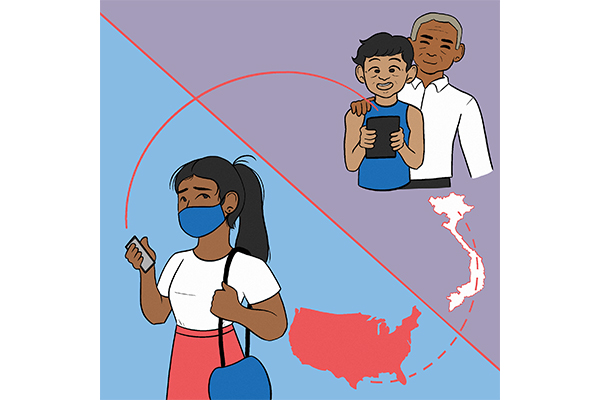UT-Austin international students reflect on COVID-19 experience here versus back home
November 25, 2020
At 2 a.m. one night in early March, among the booming bass and flickering lights of a club in London, Alex St. Germain got a call from his mom telling him to book a flight to Hong Kong for that morning.
“She told me I had to get out immediately,” said St. Germain, a petroleum engineering graduate student. “I flew home to Hong Kong a couple of days before they closed the borders to foreigners. I guess my drunk self knew I needed to be safe with family.”
St. Germain attended school in London but finished his undergraduate degree in Hong Kong. Now as COVID-19 cases ravage the United States and 17 states are imposing further restrictions, St. Germain lives alone in Austin pursuing his master’s degree while his family is scattered in France, the U.K. and Hong Kong.
With COVID-19 experiences that contrast with their families’ realities back home, international students in Austin reflect on the ways the pandemic has affected their family relationships. The U.S. currently leads in total confirmed COVID-19 cases with over 12 million cases and has seen over 250,000 COVID-19-related deaths, according to the World Health Organization.
“It’s like we’re living in two different worlds,” electrical engineering sophomore Tadilo Demisie said. “(My parents) constantly ask, ‘What’s going on?’ They hear on the news how many people are dying and call me every day to make sure I’m not one of them.”
Demisie’s family lives in Ethiopia, where there are 106,591 total confirmed COVID-19 cases as of Tuesday.
“If my parents got (COVID-19), I don’t know what treatment would look like,” Demisie said. “But now my parents consistently worry about my well-being. They told me to drop out of (UT) and go back to Africa to attend college there.”
St. Germain lived in Hong Kong during the SARS epidemic in 2003 with his parents and four siblings. While St. Germain was only seven at the time, he said he remembers wearing masks and quarantining. He said that experience has helped his family adjust to COVID-19 regulations.
Now, St. Germain and his parents are more worried about the mental health of some of his relatives in Europe as several countries, including France, have entered another lockdown.
“My grandparents, cousins and siblings are completely isolated,” St. Germain said. “It’s evolved past a (COVID-19) pandemic. It’s now also a mental health epidemic.”
St. Germain said he feels isolated from his family because it’s hard to contact them due to time differences and his academic workload.
Three days ago, Ulrike Unterweger, an architectural history Ph.D. candidate, flew straight into a lockdown in Austria to visit her family for the holidays and escape isolation in Austin.
“There’s no right choice for me,” Unterweger said. “If I stay in the U.S., I’m isolated, … (when) I go home, I’ll be in lockdown, and I don’t know if my mental health can take it. The only silver lining is I will be reunited with my family.”
Unterweger and St. Germain said the worst part about being separated from their families is the loneliness and ravaging thoughts of “what ifs.”
“Yes, we are all going through a pandemic, but it’s hard to relate to one another,” St. Germain said. “How is my family supposed to know how empty I feel in my apartment with no friends in a foreign city? How am I supposed to know what it feels like to walk around without a mask and feel at home? We are on separate continents experiencing different circumstances.”











